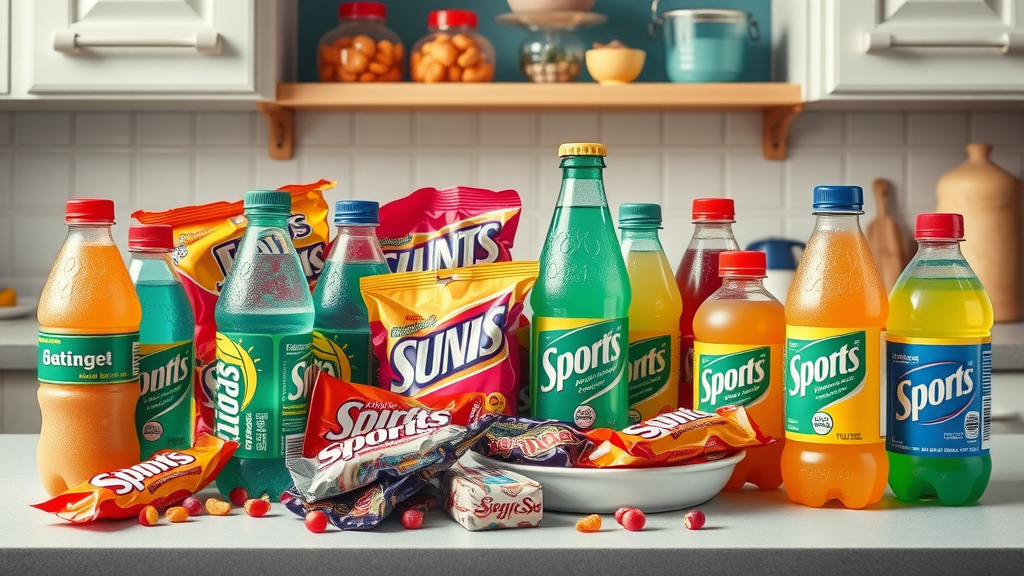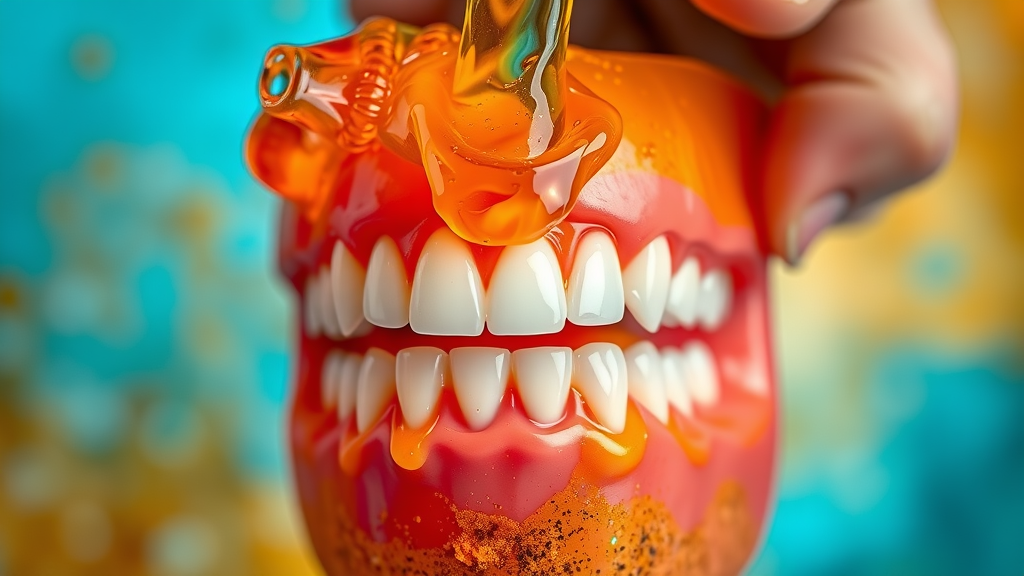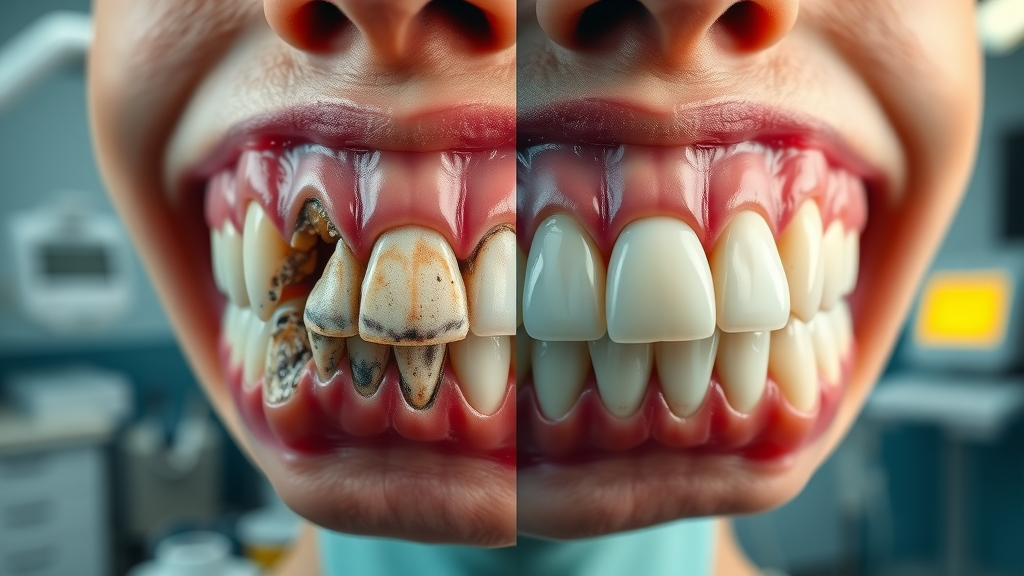
"Did you know that over 90% of adults have at least one dental filling? It’s not just genetics—our daily habits silently shape our dental destiny."
Understanding What Habits Are Bad for My Teeth: Why Awareness Is the First Step to Better Oral Health
When you pause to consider what habits are bad for my teeth , you might be surprised that the daily actions we don't even think twice about could be slowly sabotaging our oral health . Many people are shocked to learn that dental problems aren’t always the result of genetics or age—more often, they develop due to little habits we’ve picked up over time. The first step to a healthier, brighter smile is understanding which behaviors do the most damage. Making informed choices today can help you avoid cavities, gum disease, and even the need for expensive dental treatments down the road.
Awareness is critical for change. By identifying your own bad habits , you give yourself the power to make positive changes that last a lifetime. From quitting nail biting to swapping out sugary snacks, the journey to ideal dental health starts with knowledge. Let’s explore which daily actions might be undermining your teeth and gums without you even knowing it—and how you can develop better, healthier routines for the whole family.
-
You'll discover which hidden behaviors are harming your teeth and gums.
-
Practical strategies to break these bad habits.
-
Science-backed insights for improving your dental health.
-
Actionable tips for long-term oral health.
|
|
|
Comparison of Habits: Risk Levels for Dental Health |
|
Bad Habit |
Potential Oral Health Damage |
Risk Level |
|---|---|---|
|
Nail biting |
Chipped teeth, jaw issues |
Medium |
|
Eating ice cubes |
Cracked enamel, sensitivity |
High |
|
Teeth grinding |
Worn teeth, headaches |
High |
|
Sugary foods |
Cavities, gum disease |
High |
Many of these habits, especially those that impact your gums, can set the stage for more serious oral health issues if left unchecked. For a deeper look at how to protect your gums and prevent long-term complications, you may find it helpful to review practical strategies for preventing periodontal disease and keeping your mouth healthy at every stage of life.
The Top 15 Bad Habits That Threaten Your Teeth and Gums
1. Nail Biting: Why This Bad Habit Can Crack and Chip Your Teeth
Nail biting might seem harmless, but it’s among the most common bad habits that directly threaten your teeth and gums. The pressure from biting hard nails can cause teeth to crack, chip, or wear down unevenly, leaving you vulnerable to tooth sensitivity and even jaw issues. Over time, repeated biting places stress on both the teeth and the temporomandibular joint (TMJ).
Beyond chipped teeth, nail biting can introduce bacteria from your hands directly into your mouth, increasing the risk of oral infections and gum disease . Sometimes, it even leads to a bitter nail taste if remnants of nail polish or other chemicals linger. Individuals who bite their nails may also find they suffer from increased bad breath due to the transfer of food particles and bacteria. If you’re struggling to stop, try using a bitter nail polish as a deterrent or keeping your hands busy during stressful moments.
2. Chewing Ice Cubes: The Surprising Toll on Your Dental Health
Chewing on ice cubes is another innocent-seeming habit that poses significant risks to your teeth. This bad habit can create tiny fractures in your tooth enamel, which expand over time and eventually become full-on cracks or chips. People who regularly chew ice may notice sudden pain or sensitivity when consuming hot or cold foods, warning signs that damage is already underway.
Your tooth enamel is the hardest substance in your body, but it’s not indestructible. The repeated pressure of crunching ice wears it down, opening the door for tooth decay and gum disease as bacteria seep into micro-damage. Dentists strongly recommend letting ice melt in your mouth instead of chewing and exploring cold, crunchy alternatives for that satisfying texture, like chilled veggies or sugar-free gum.

3. Using Teeth as Tools: Hidden Dental Dangers in Everyday Shortcuts
Have you ever used your teeth to open a packet, tear off a clothing tag, or twist open a bottle? While it might seem quick and convenient, using teeth as tools is a bad habit that risks everything from chipped or cracked teeth to injured gums and jaw strain. Your teeth are meant to process food, not withstand the pressure of breaking plastics or twisting metal.
Over time, this behavior leads to cumulative damage that might not be obvious until a piece of tooth breaks unexpectedly. Dentists advise keeping actual tools—like scissors or bottle openers—on hand to curb the temptation and protect your teeth . The American Dental Association even lists “using teeth as tools” among the top things to avoid for optimal oral health .
4. Teeth Grinding (Bruxism): Causes, Consequences, and Solutions
Teeth grinding, also known as bruxism , is a hidden villain when it comes to dental health . Many people don’t realize they’re doing it—especially at night—but the effects add up quickly. The bad habit of grinding your teeth leads to severe wear, flattened or chipped enamel, headaches, and even long-term jaw pain.
Common causes of bruxism include stress, anxiety, or misaligned teeth. Left untreated, the condition can escalate, causing not only tooth loss and gum disease but also headaches and persistent facial discomfort. Wearing a mouth guard at night is one of the best ways to shield your teeth and gums from unnecessary damage. If you suspect you’re grinding your teeth, consult your dentist for a custom night guard and stress reduction strategies.

5. Skipping Brushing Your Teeth: How Inconsistent Oral Hygiene Leads to Tooth Decay
Forgetting—or neglecting—to brush your teeth regularly is a fast track to tooth decay and gum disease . Oral bacteria thrive on leftover food particles, producing acids that erode your teeth and create cavities. This bad habit often begins innocently, but over time, missing brushings can lead to a buildup of plaque, tartar, and dental problems that require more intensive care.
The key is consistency. Develop a care routine that includes brushing twice a day with fluoride toothpaste and a soft bristle toothbrush, ensuring you cover all tooth surfaces. Flossing once a day helps remove hidden food particles and keeps your teeth and gums healthy for years to come.
6. Gum Disease from Poor Dental Health Habits: Early Signs and Preventive Measures
Gum disease is a silent threat that often starts with bad habits like poor brushing, infrequent flossing, and skipping dental visits. Early symptoms—like bleeding gums, redness, and persistent bad breath —can sneak up without pain, making it easy to ignore the warning signs.
When left unaddressed, gum disease progresses from mild gingivitis to severe periodontitis, which may result in tooth loss . Early intervention is vital. Adopt a dedicated oral health routine and visit your dentist for regular checkups to reverse early-stage problems and safeguard your smile.
7. Frequent Consumption of Sugary Foods and Sports Drinks: Impact on Tooth Decay
Regularly eating sugary foods or consuming sports drinks can set off a chain reaction that results in cavities and significant tooth decay . The sugar feeds harmful oral bacteria, which generate acid that attacks your enamel and gums. Sports drinks, which are often acidic as well as sweet, pose an extra threat by weakening enamel and making teeth vulnerable to decay.
Limiting your intake of sweets and sports drinks, and choosing whole fruits or water instead, helps you maintain a healthy mouth. If you do indulge, rinse your mouth with water afterwards and avoid brushing immediately, as enamel can be temporarily softened by acid exposure, increasing the risk of wear.

8. Neglecting Mouth Guard Use During Sports: Increased Risk to Teeth and Gums
Playing sports without a mouth guard is a bad habit that significantly increases the risk of dental injuries, including broken teeth, cut lips, and even tooth loss . Both contact and non-contact sports expose your teeth and gums to accidental impact at any moment. Without a protective guard, even a simple slip or collision can result in dental trauma that requires complex treatment.
Investing in a custom-fitted mouth guard from your dentist is the best way to protect your teeth . Reinforce this habit with your kids, teenage athletes, and anyone prone to accidental falls or impacts. Your future smile will thank you!
9. Regular Use of Chewing Tobacco: How It Endangers Oral Health
Chewing tobacco and other tobacco products do more than stain your teeth—they significantly increase your risk of oral cancer , gum disease, and tooth loss . The harsh chemicals found in these products irritate soft tissues and destroy the bone supporting teeth. Regular use also contributes to stubborn bad breath and chronic dental problems that are easily preventable.
Quitting tobacco is crucial for anyone looking to improve their oral health and reduce the risk of serious long-term complications. Seek support from dental professionals, friends, and family to increase your chances of quitting for good.
10. Not Visiting the Dentist Regularly: Overlooked Risks for Oral Health
Skipping regular dental checkups is a bad habit that’s both common and costly. Without professional cleanings and early detection of dental problems, issues like tooth decay , gum disease , and even oral cancer can progress without obvious symptoms. Most dental health issues are managed best when caught early, helping you avoid pain, expense, and complex procedures.
The American Dental Association recommends biannual checkups—and more frequent visits if you have ongoing issues or risk factors. Preventive care saves money in the long run and ensures your teeth and gums stay healthy for a lifetime.

11. Frequent Snacking: Continuous Acid Attack on Teeth
Frequent snacking, especially on sugary or starchy foods, keeps your mouth’s pH low and creates a continuous acid assault on your tooth enamel . These acids can linger for twenty minutes or more after each snack, leading to cumulative erosion and eventual tooth decay .
Try to minimize between-meal snacking and choose nutritious options like cheese, yogurt, or crunchy vegetables if you’re hungry. Drinking water with snacks also helps clear away food particles and acids, preserving your dental health in the process.
12. Drinking Sports Drinks: The Acidic Assault on Teeth Enamel
While marketed for hydration and energy, sports drinks are typically high in acid and sugar. This potent combination erodes tooth enamel , increasing cavity risk—even more than some carbonated sodas. The impact is even worse if you sip these drinks slowly over time, prolonging your teeth’s exposure to acids and sugars.
Substitute water whenever possible, and save sports drinks for times of true athletic need. Rinse your mouth with water after consumption to dilute acids and sugar, and avoid brushing right after to prevent further enamel erosion.
13. Aggressive Brushing Your Teeth: How Hard Bristles Harm Your Gums and Enamel
It’s possible to have too much of a good thing. Aggressive brushing your teeth using a hard-bristled toothbrush can actually wear away tooth enamel and cause gum recession, making you more susceptible to sensitivity and decay. This is one of those bad habits that often develops when people are overly enthusiastic about dental care.
Switch to a soft bristle toothbrush and use gentle, circular strokes. Let the bristles—and your fluoride toothpaste—do most of the work. Healthy gums and teeth don’t require heavy force, just regular, careful maintenance as recommended by your dental care team.
14. Inadequate Flossing: Plaque Buildup and Gum Disease
Even if you brush every day, skipping flossing leaves food particles and plaque between your teeth that a toothbrush can’t reach. Over time, this creates a breeding ground for bacteria and leads to gum disease and tooth decay . Plaque buildup hardens into tartar, which can only be removed by a dentist.
Floss once daily, taking care to get beneath the gumline. This simple practice keeps your teeth and gums healthy, reduces bad breath , and prevents issues before they start. If you struggle with traditional floss, try floss picks or a water flosser for convenience.
15. Sipping Sodas and Fruit Juices: Prolonged Exposure Weakens Teeth
Slowly sipping sugary sodas and fruit juices throughout the day constantly bathes your teeth in acid and sugar. The result? Weakening of your tooth enamel and a higher chance of cavities. Even 100% fruit juices are acidic enough to wear away enamel if consumed too often.
Limit consumption of these beverages to mealtimes or switch to plain water to support healthy oral health . Using a straw can help minimize contact with your teeth, further reducing risk. Remember: how you consume sugary drinks can be just as important as how much you consume!

What Habits Are Bad for My Teeth? Insights from Dental Health Experts
"Your teeth can't heal themselves—think before you chew on that pen or open that bottle with your mouth." — Dr. Brian Walsh, DDS

According to leading dental professionals, the cumulative impact of seemingly minor actions like biting your nails, chewing on pens, or regularly sipping on sweet drinks can quietly devastate your teeth and gums over time. Experts also stress that dental health is influenced not just by what you eat, but by how often you expose your teeth to sugars and acids, and how consistently you follow a care routine .
Dentists highlight the importance of regular checkups for catching early signs of damage. Waiting until you feel pain often means a dental problem has already advanced. Their advice? Build healthy habits now, replace your toothbrush every 3-4 months, use fluoride toothpaste, and never underestimate the value of flossing.
How to Break the Cycle of Bad Habits for Better Oral Health
-
Practice strategies such as substituting cheap fidget toys or stress balls to replace nail biting .
-
If you grind your teeth, ask your dentist about a custom mouth guard and stress-reducing exercises.
-
Switch up snacks for more teeth-friendly options—think cheese, celery, or unsweetened yogurt instead of sugary foods .
-
Always use a mouth guard when playing sports, no matter your age or skill level.
-
Brush your teeth gently with a soft bristle toothbrush in small circles; set reminders on your phone for brushing and flossing so you never skip a day.

Comparing the Risks: What Causes the Most Damage to Teeth and Gums?
|
|
|
Bad Habits Ranked by Severity |
|
Habit |
Frequency |
Long-term Effect |
|---|---|---|
|
Teeth grinding |
Nightly |
Severe wear |
|
Sugary foods |
Continuous |
Cavities, decay |
|
Neglecting dental visits |
Months/years |
Undiagnosed issues |
Habits to Adopt: 10 Things to Keep Your Teeth Healthy
-
Brush your teeth twice daily.
-
Floss every day.
-
Use fluoride toothpaste.
-
Limit sugary foods and sports drinks.
-
Wear a mouth guard during sports.
-
Don’t use your teeth as tools.
-
Get regular dental checkups.
-
Choose water over soda.
-
Avoid chewing tobacco.
-
Eat a balanced diet with plenty of fresh produce.
People Also Ask: What Habits Are Bad for Your Teeth?
What habits are bad for your teeth?
-
Nail biting
-
Chewing ice cubes
-
Teeth grinding
-
Using teeth as tools
-
Frequent snacking on sugary foods
-
Skipping regular dental visits
-
Not flossing
-
Drinking soda
-
Aggressive brushing
-
Using chewing tobacco
What is the most damaging thing for your teeth?
-
Consistent neglect of dental health by combining poor oral hygiene, frequent high-sugar diets, and no dental visits inflicts the most comprehensive damage, leading to advanced tooth decay and gum disease.
What are 10 things to keep your teeth healthy?
-
Brush twice daily
-
Floss daily
-
Eat fewer sugary foods
-
Wear a mouth guard
-
Attend regular checkups
-
Choose water
-
Avoid chewing tobacco
-
Moderate acidic drinks
-
Use fluoride
-
Don’t use teeth as tools
What causes the most damage to teeth?
-
Acidic and sugary foods
-
Skipping brushing your teeth
-
Neglecting flossing
-
Using teeth to open objects
Frequently Asked Questions on What Habits Are Bad for My Teeth
-
Can I reverse damage from bad habits on my teeth? While you can’t always reverse damage like enamel loss or deep cavities, you can prevent further harm by improving your dental care routine and working with your dentist on restorative options.
-
Which oral habits lead to gum disease most quickly? Inconsistent brushing, skipping flossing, and regular consumption of sugary foods are leading culprits in rapid gum disease progression.
-
How often should I replace my toothbrush? Replace your toothbrush every 3–4 months, or sooner if bristles become frayed.
-
Is chewing sugar-free gum bad for my teeth? Sugar-free gum can actually help dental health by increasing saliva flow and helping remove food particles, but avoid overuse if it causes jaw fatigue.
-
What natural remedies help with dental health? Rinsing with plain water after meals, eating fibrous fruits and vegetables, and drinking green tea for its antibacterial properties can naturally support oral health.
Improve Your Dental Health: Proven Strategies from Johnstown Dental Care
"Your daily choices shape your smile for a lifetime. It’s never too late to break bad habits and support excellent oral health."
At Johnstown Dental Care, we’ve helped hundreds of local families break the cycle of bad oral habits and build routines that really work. We recommend starting with small, sustainable changes, booking regular checkups, and reaching out for support if you struggle with persistent habits like grinding or tobacco use.
Take Charge of Your Oral Health in Johnstown, Granville, New Albany, and Beyond
-
Contact Johnstown Dental Care at 370 West Coshocton St. Johnstown, OH 43031. Phone: (470) 967-6046.
-
Website: www.johnstowndentalcare.com
-
Johnstown, New Albany, Granville, Alexandria, Pataskala, and surrounding areas in Licking County, Franklin County, and Delaware County.
-
Book an appointment to protect your family’s dental health today!
Take Action: Break old bad habits, adopt proven oral health routines, and book your next dental checkup with Johnstown Dental Care for a confident, healthy smile.
If you’re ready to take your oral health to the next level, there’s a wealth of additional guidance available to help you make informed choices for your smile. Explore the Dental Care Resources hub for expert tips, advanced prevention strategies, and answers to common dental questions. Whether you’re looking to fine-tune your daily routine or want to understand the latest in dental care, these resources are designed to empower you and your family. Dive deeper and discover how small changes today can lead to a lifetime of healthy, confident smiles.
To further enhance your understanding of habits that can harm your teeth, consider exploring the following resources:
-
“11 Habits That Damage Teeth” : This article from Colgate outlines common behaviors detrimental to dental health, such as brushing too hard, nail biting, and chewing ice, providing insights into their effects and tips for prevention. ( colgate.com )
By delving into these resources, you’ll gain a comprehensive understanding of detrimental dental habits and practical steps to maintain a healthy smile.
 Add Row
Add Row  Add
Add 




Write A Comment